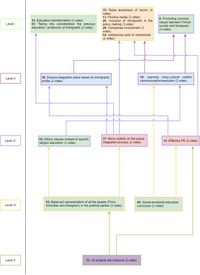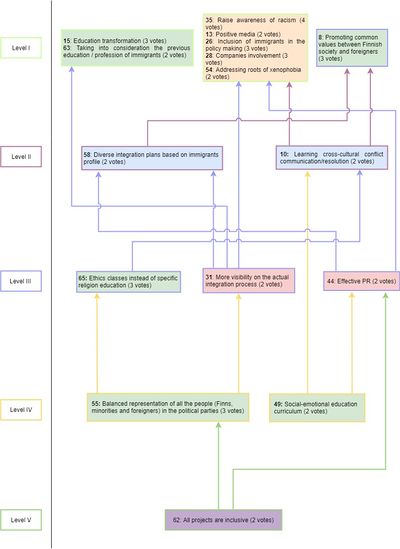The Challenges of Integration of Minority Groups in Swedish-speaking Ostrobothnia: Structured Dialogic Design as a Tool of Enhancing Diversity and Inclusion - Identification of Actions: Difference between revisions
No edit summary |
No edit summary |
||
| Line 5: | Line 5: | ||
|Triggering_Question=What actions (political, educational, financial, sociocultural) can be taken in order to facilitate the inclusion of Finns in the integration process of minority groups in Swedish speaking Ostrobothnia? | |Triggering_Question=What actions (political, educational, financial, sociocultural) can be taken in order to facilitate the inclusion of Finns in the integration process of minority groups in Swedish speaking Ostrobothnia? | ||
|location=Vassa, Finland | |location=Vassa, Finland | ||
|dates=23rd | |dates=23rd September 2018 | ||
|project=[[Peace, Mediation and Conflict Research & Minority Studies, Abo University]] | |project=[[Peace, Mediation and Conflict Research & Minority Studies, Abo University]] | ||
|LeadFacilitator=[[Andreas P. Andreou]] | |LeadFacilitator=[[Andreas P. Andreou]] | ||
Revision as of 03:08, 18 February 2019
|
Executive Summary
The Structured Dialogic Design Co-Lab/Workshop entitled The Challenges of Integration of Minority Groups in Swedish-speaking Ostrobothnia: Structured Dialogic Design as a Tool of Enhancing Diversity and Inclusion - Identification of Actions was organized by Hasan Habes as part of his PhD research project funded by the Peace, Mediation and Conflict Research & Minority Studies Department of the Abo University. It was part of the Peace, Mediation and Conflict Research & Minority Studies, Abo University project.
The aim of his research is to enhance diversity and inclusion of the minority groups such as migrants, ethnic/racial and sexual groups by identifying the challenges they face during the integration process to the society and by developing action plans to overcome these challenges. This Co-Lab/Workshop aimed to bring knowledgeable individuals from different societal groups together under one roof in Vaasa to discuss and identify the challenges and obstacles they face in today’s conditions, and to develop a focused and targeted action plans and solutions collectively towards these issues.
The workshop was held on September 23rd 2018 at Abo University in Vaasa, Finland with the participation of twelve (12) participants.
The Triggering Question (TQ) of the workshop was:
What actions (political, educational, financial, sociocultural) can be taken in order to facilitate the inclusion of Finns in the integration process of minority groups in Swedish speaking Ostrobothnia?
In response to the TQ, the 12 participants came up with 66 ideas, which were categorized in 8 clusters. Following the voting process, 36 ideas received one or more votes and were structured to create the influence MAP shown below.
According to the participants of this workshop, the ideas that appear to be the most influential were:
- Action #62: (2 votes) All projects are inclusive
- Action #55: (3 votes) Balanced representation of all the people (Finns, minorities and foreigners) in the political parties
- Action #49: (2 votes) Social-emotional education curriculum
The workshop was facilitated by Andreas P. Andreou and Hasan Habes.

